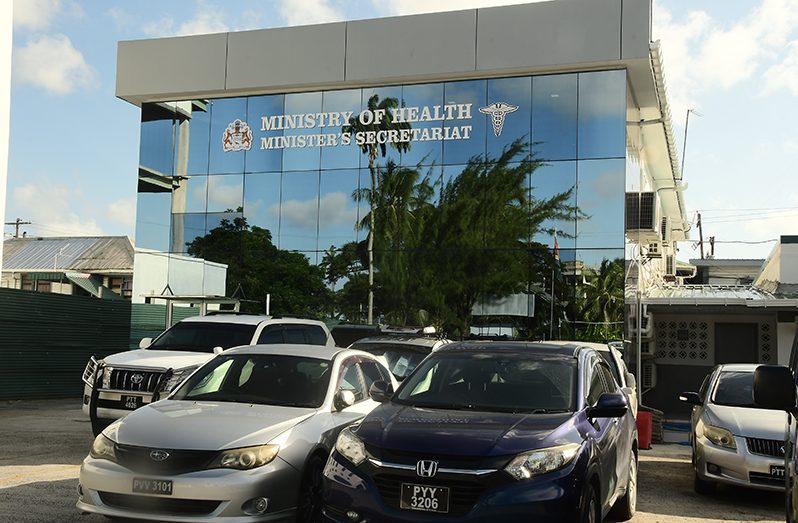By Dillon Goring
BREAKTHROUGH ACTION Guyana, an international organisation which is funded by the United
States Agency for International Development (USAID) and led by Johns Hopkins Center for Communication Programs, is committed to its goal of improving malaria outcomes in mining communities in Regions One, Seven and Eight through innovative social and behavioural-change interventions.
The project provides support to the Ministry of Health’s (MoH’s) Rapid Diagnostic Testing (RDT) programme that trains volunteer testers in mining communities to test and treat for malaria. Through Breakthrough ACTION (BA), volunteer testers have been provided with treatment-regimen guides to assist in accurately prescribing treatment, flags certificates and tester’s toolkits to increase their visibility and to formalise the test and treatment service, rapid counselling cards (RCC) to accurately counsel clients and treatment handouts for the clients to simplify the treatment and encourage treatment adherence, which must complete treatment to remove all the parasites.
In combating the spread of the disease, the organisation has also launched a Little Mosquito/Big Problem (LMBP) SBC campaign that includes a theme song with music video “Big Problems Coming” which raise risk perception.
Inclusive in this fight, according to Dr. Joann Simpson (Programme Officer 2) during an interview with Pepperpot Magazine, are radio spots, which focus on testing and treatment adherence.
The LMBP Facebook page includes mining personalities that share experiences about malaria, give advice about prevention, treatment and adherence, and a ‘Jungle Feevah’ mini-series which include a story of a miner from Facebook and his experience working in the “backdam” with posters in Spanish, English and Portuguese.
According to Simpson, Carestart Rapid Diagnostic Testing (RDT) being used by the Ministry of Health (MoH) is 90 percent accurate. While microscopy remains the gold standard, the use of RDTs is beneficial in hard-to-reach areas with limited access to health facilities. RDTs enable fast and accurate testing for malaria.
Funding
Breakthrough ACTION Guyana is funded by the United States Agency for International Development (USAID). The organisation, according to Simpson, is prepared to render assistance in the area of rapid testing until December 2021.
The pandemic’s effect on the organisation’s work
Simpson revealed that the organisation has been severely affected as a result of the pandemic.
The production of printed materials and projects pivoted to social media and radio.
Thus, travel to the hinterland to roll out tester materials and to monitor testers has also been affected.
Face-to-face workshops were changed to virtual, but he stated that there were internet connectivity issues in the regions.
Plans for 2021
Simpson revealed that the organisation has plans to have an increased presence on Facebook (FB), TV and radio during the rainy season when malaria cases rise.
There are also plans to create a Jungle Feevah radio drama based on the social media series, produce DVDs and flash drives with materials for distribution at mining camps, develop print materials for health facility waiting rooms and restaurants and conduct visits to testers to restock materials and get feedback to improve tools.
According to reports in the Guyana Chronicle dated January 3, 2017 there has been a “15 percent reduction of malaria cases; from 13,245 in 2015 to 11,149 in 2016”. When asked, what might have been the main cause for this reduction and what role the organisation played in this reduction, Simpson noted that “Breakthrough ACTION Guyana only began to implement its programmes in 2019… but we do anticipate that our interventions will increase prompt malaria care-seeking, improve treatment adherence and use of LLINs which will over time reduce the malaria burden.
“ Breakthrough ACTION Guyana recognizes malaria as a major public concern for persons in the hinterland regions and will continue to support the MoH’s effort to reduce the malaria burden,” Simpson revealed to Pepperpot Magazine
Breakthrough ACTION Guyana is advising that persons living in endemic regions should sleep under LLINs every night and wear long sleeves, light-coloured clothing when out at night.
If symptoms such as fever, headache, chills and muscle pain are present, persons should get tested and treated early to prevent the spread to others through mosquito bites, he advised.
A mosquito can bite an infected person and then bite another person and infect them; it is, therefore, important to complete all the malaria treatment if positive to remove all the parasites from one’s body and not inadvertently spread to others, Simpson stated.



.jpg)









